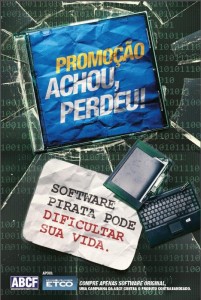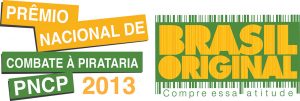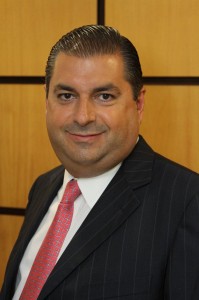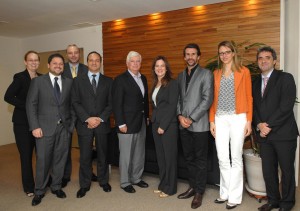 The Brazilian Association to Combat Counterfeiting (ABCF), with the support of ETCO, launched, in July, in Curitiba, the campaign “Promotion Achou, Perdeu!” The initiative draws the consumer's attention to the risks of smuggled products to safety and health. A series of advertising pieces will run on billboards, bus stops and communication vehicles in Curitiba until October. The city was chosen to host the campaign for the importance of Paraná in combating smuggling via a triple frontier.
The Brazilian Association to Combat Counterfeiting (ABCF), with the support of ETCO, launched, in July, in Curitiba, the campaign “Promotion Achou, Perdeu!” The initiative draws the consumer's attention to the risks of smuggled products to safety and health. A series of advertising pieces will run on billboards, bus stops and communication vehicles in Curitiba until October. The city was chosen to host the campaign for the importance of Paraná in combating smuggling via a triple frontier.
Tag: Combating Piracy
ABES eliminates 11 illegal software download links
Entity also celebrates the first anniversary of the Legal Entrepreneur project, an initiative that encourages the use of licensed programs
ABES, an association of software companies, removed 11.557 illegal download links for computer programs in the first three months of the year. Of that total, 4.037 were removed specifically from auction sites, an increase of 12,6% compared to the number of such links blocked in the first three months of last year.
Recently, ABES monitoring has gained support from the Free Market Intellectual Property Protection Program (PPI). Through the program, the removal of illegal software offers on the site is now done within 24 hours.
Also according to the entity, another 7.509 illegal links were disabled in the first quarter of the year. The amount is 3,1% lower when compared to the number of blockades of the type made in the first quarter of 2013. The entity claims to have taken down 11 websites for downloading illegal programs. Last year, the association removed 15 Internet addresses.
For ten years, ABES has monitored the internet for links to download copyrighted software belonging to its members. Both the website hosting the links and their ISPs are notified to remove the content. If pirated programs remain available, they are then prosecuted, based on current legislation.
Legal Entrepreneur
The ABES initiative “Empreendedor Legal”, which encourages the use of licensed software in the corporate environment, completed a year on April 26, World Intellectual Property Day. In a year of activities, the program held 12 awareness events and information campaigns on the use of legal software in the cities of Salvador (BA), Rio de Janeiro (RJ), São Paulo (SP), Barueri (SP) and Jaraguá do Sul (SC).
In addition to events and campaigns, ABES celebrates 23 thousand accesses to the portal Legal Entrepreneur Channel created especially for the initiative. The site has content about the importance of using legal software and the consequences of using pirated products. Also according to the organization, 34 thousand reports of outbreaks of piracy were brought to justice through the website Anonymous Reporting Against Software Piracy, which has an access link from Legal Entrepreneur Channel.
The ABES initiative is supported by Apex-Brasil; Brazilian Association of Intellectual Property (ABPI); BSA - The Software Alliance; National Conference on Trade in Goods, Services and Tourism (CNC); National Council to Combat Piracy (CNCP); Brazilian Institute of Competitive Ethics (ETCO); Competitive Brazil Movement (MBC) and the Brazilian Small and Micro Enterprise Support Service (Sebrae).
With information from the press office of ABES
Judging commission of the National Piracy Combat Prize installed
ETCO is the project manager who, in 2013, had 20 entries

The third edition of the National Piracy Combat Prize (PNCP) had, on October 23, its judging commission officially installed during a meeting at the National Secretariat for Judicial Reform of the Ministry of Justice (SRJ / MJ), in Brasília (DF) . ETCO is the project manager, created by the National Council to Combat Piracy and Intellectual Property Offenses (CNCP).
Competitors include universities, unions, chambers of commerce, customs agencies and even police stations. In total, 20 projects were entered between September 9th and October 15th, double the number of works entered in the last edition of the award. The judging commission is now tasked with choosing the best candidates in three areas: economic, repressive and preventive / educational.
The PNCP jury is formed by the Minister of the Superior Court of Justice Sidnei Beneti; by Senator Vanessa Grazziotin; by the President of the Chamber of Deputies' Committee to Combat Piracy, Guilherme Campos; by former Minister of Development, Industry and Foreign Trade Luiz Fernando Furlan and by the Attorney General of the Federal District and Territories, Eunice Pereira Amorim Carvalhido, President of the College of Attorneys General.
On December 3, National Day to Combat Piracy, the result of the award will be announced at a ceremony in Brasília.
PNCP is part of the guidelines of the III National Plan to Combat Piracy, which was launched in May and is valid from 2013 to 2016. The initiative aims to identify, recognize and reward public and private entities that stand out in the fight against piracy and other crimes against intellectual property.
The CNCP was created in 2004 and has in its composition government agencies and civil society entities represented by sectors affected by piracy in the country. CNCP is a government entity composed of representatives of public and private power, a pioneer initiative in the world in what the protection of intellectual property.
Representative of major US film studios talks about piracy on ETCO visit
Former US senator and current CEO of the Motion Picture Association of America, Christopher Dodd discussed the ways of combating piracy in Brazil
Motion Picture Association of America (MPAA) CEO Christopher Dodd visited the ETCO headquarters in São Paulo on the morning of August 30. A former American Democratic senator and now a spokesman for the major film studios in the United States, Dodd was in Brazil for a series of meetings with government officials and businessmen in the national film industry. He made space on his agenda to get to know ETCO and the work that has been done by the Institute in combating unfair competition, which includes piracy.
After attending a presentation on ETCO made by the Executive Director, Heloisa Ribeiro, he praised the work carried out in the Institute's first decade of operation and acknowledged Brazil's difficulties in terms of combating piracy. “I am impressed with what you do. I learned a lot and I will certainly carry on with this experience, ”said Christopher Dodd.
“As it is an important and critical market, in Brazil the work of inspecting piracy and illegal trade, in addition to defending intellectual property, which is now done within the scope of large corporations, must also reach small companies. Furthermore, as ETCO has shown, children need to be prepared for the future, ”said Dodd, of the need to teach future generations that piracy is a crime.
Brazil and other countries in the world have assumed great importance for the American film industry - one of the main export products of the United States -, considering that 60% of the revenue of this industry comes from outside the USA. And it is an industry highly affected by piracy worldwide.
"A big problem is that piracy is socially acceptable," the former senator told an audience of representatives from ETCO's sectoral chambers and some of his partners. According to him, with the growth of the internet, access to the pirated product has become easier, while the pirate producer has become more difficult to be located. "We have been working on technologies to combat internet piracy, but it is sophisticated."
Dodd, a former Democratic senator from Connecticut for 30 years (from 1981 to 2011), took over as CEO of the MPAA in March 2011.
ETCO will participate in seminar on combating piracy in health
Event, which takes place on September 9, at Amcham, will discuss the impacts of piracy on the health of the population
On September 9, ETCO's Executive President, Roberto Abdenur, will mediate at the Seminar to Combat Piracy in Health, held by the American Chamber of Commerce Brazil-United States (Amcham).
At the event, the reality of piracy in the area and the impacts of this practice on the health of the population, the country's economy and the competitiveness of companies will be discussed.
The seminar is part of the activities of the Subgroup to Combat Piracy in Health at Amcham and will also count on the presence of the executive president of the Brazilian Association of the High Technology Industry of Medical-Hospital Equipment, Products and Supplies, Carlos Goulart; Lilly's global counterfeit drug operations manager, Grant Lindman; and the head of the Division for the Suppression of Smuggling and Misuse of the Internal Revenue Service, Alan Towersey; besides senator Humberto Costa (PT / PE).
Data: September 9th - 8:30 am to 12:XNUMX pm
Location: American Chamber of Commerce (Amcham)
Address: Rua da Paz, 1.431, São Paulo (SP)
More information: hector.modesto@amchambrasil.com.br
Salvador joins the Free Piracy City Program
With the signing of the agreement, eight municipalities have already joined the Ministry of Justice program, whose management is under the responsibility of ETCO. Goal is to reach all host cities of the 2014 World Cup
 Salvador, in Bahia, will be the eighth Brazilian municipality to be part of the Cidade Livre de Piracy Program, of the National Council for Combating Piracy and Intellectual Property Offenses of the Ministry of Justice (CNCP / MJ). The program is managed by the Brazilian Institute of Ethics in Competition (ETCO) and aims to municipalize the fight against illegal trade.
Salvador, in Bahia, will be the eighth Brazilian municipality to be part of the Cidade Livre de Piracy Program, of the National Council for Combating Piracy and Intellectual Property Offenses of the Ministry of Justice (CNCP / MJ). The program is managed by the Brazilian Institute of Ethics in Competition (ETCO) and aims to municipalize the fight against illegal trade.
The cooperation agreement will be signed tomorrow, July 12, at 11 am, at the Chamber of Shopkeepers (CDL) of Salvador. The mayor of the Bahian capital, Antônio Carlos Magalhães Neto, will sign the agreement, in a ceremony that will also be attended by the President of the CNCP, Flavio Crocce Caetano, the Executive Secretary of the CNCP, Rodolfo Tamanaha, and the ETCO representative, Márcio Gonçalves.
Started in 2010 and already implemented in São Paulo, Curitiba, Brasília, Belo Horizonte, Osasco, Rio de Janeiro and Vitória, the program aims to municipalize the fight against illegal trade in products, so that the participating cities actively take on the fight against piracy, developing actions in conjunction with municipal, state and federal institutions, as well as representatives of civil society. Thus, all anti-piracy measures, such as inspection, product seizure operations and awareness campaigns, among others, are now being worked on in an integrated manner and coordinated by the city hall, which guarantees more efficiency and better results.
As a program manager since 2009, ETCO's goal is to expand the program's membership in the country's main municipalities. This year, the priority is the host cities for the 2014 FIFA World Cup Brazil, as is the case in Salvador, which will have six games played at the Fonte Nova Arena.
“The successful experience of São Paulo, the first municipality to be part of the program, shows that it is possible to succeed in combating piracy, placing the issue above political interests”, says ETCO Executive President, Roberto Abdenur. According to him, “the practice of piracy is one of the most harmful forms of unfair competition, since, by subverting the rules of intellectual property to obtain illicit commercial advantages, the piracy 'industry' discourages free competition and inhibits investments in research and technology for Development of new products".
In turn, the President of the CNCP, Flavio Crocce Caetano, states that “the partnership established with the municipalities aims to debate and propose actions that take into account the local particularities of each municipality, making public policies to combat piracy more effective. ”. In the same vein, Rodolfo Tamanaha, Executive Secretary of CNCP, asserts that the “Piracy-Free City Project encourages local actors, led by the respective city hall, to present the main problems related to piracy, which serve to support coping actions” .
“The City of Salvador supports the initiative and will intensify, through the Public Order Secretariat, the fight against piracy. We must develop all legal means to protect intellectual property and prevent writers, singers and composers, other artists and manufacturers of electronic products, for example, from having their work pirated by people who do not contribute to the development of Brazil ”, says the mayor of Salvador, Antônio Carlos Magalhães Neto.
Legal Software brings competitive advantage and productivity

By Jorge Sukarie, President of the Brazilian Association of Software Companies (ABES)
The national software industry has enormous potential to develop innovative solutions, although it still needs incentives, both for research and development and to dampen the flow of piracy that slows the growth of the sector and prevents Brazil from becoming more competitive.
The rampant performance of the counterfeiting trade led the National Council to Combat Piracy (CNPC), an organ linked to the Ministry of Justice, to elect the need to have a dimension of this impact in Brazil, with more exact figures referring to crime, as the main action for the new Plan to Combat Piracy, announced on May 15th. To this end, several activities were suggested to be carried out by 2016, based on three main areas of activity: educational, economic and inspection. The objective is to obtain a more accurate radiography of piracy in the country.
Aware of its role and the importance of supporting the government, the Brazilian Association of Software Companies (ABES) launched, this year, the Legal Entrepreneur Campaign - http://www.empreendedorlegal.org.br, with the objective of raising awareness among Brazilian businesspeople from all sectors about the delay and the damage they can cause to their segment of activity and to the Brazilian economy, by making use of counterfeit copies of computer programs in their company. The campaign points out the legal and technical risks, in addition to highlighting the benefits of betting on legal software.
As well as this campaign, there are also other initiatives in Brazil, such as the Cidade Livre da Pirataria program. Created by the CNCP and managed by the Brazilian Institute of Ethics in Competition (ETCO), this action aims to be able to integrate the inspection and enforcement agencies to act in the municipal sphere. In the city of São Paulo alone, the program has already disclosed the seizure of more than R $ 2 billion of counterfeit products between the months of December 2010 and October 2012.
The Anonymous Complaints Against Pirate Software portal http://www.denunciepirataria.org.br/, created by ABES and BSA I The Software Alliance, is also part of these national initiatives against the crime of piracy, which has specific punishments in the country This year alone, this communication channel received more than 2.500 complaints and contributed, in March, to the seizure of 550 illegal media, carried out by local authorities in 25 computer resellers suspected of practicing irregular commerce.
However, in order to reduce the current 53% of software piracy in the country, all this great undertaking by the government and by the entities that defend the Brazilian software industry needs, a lot, the awareness of companies and users. There is no advantage in buying a counterfeit product, a crime that steals jobs in the country, reduces tax collection, which would be used to benefit society, and also encourages organized crime.
For those who still believe they are doing a good business competing in the market with illegal software licenses, a study carried out in 95 countries, recently released by the BSA I The Software Alliance, concluded that legal software brings greater economic stimulus than pirated software. The increase of just 1% in the use of legal software worldwide would bring a global return of US $ 73 billion. In contrast, with the same growth, the use of pirated software would add less than a third to the global economy, or about $ 20 billion.
This year, IDC also issued a warning to companies that still believe it is convenient to compete in the market illegally and have not provided an audit of their technology park to check which licenses are active on their machines.
The research institute revealed that the chances of infection by unexpected malware reach one in three consumers and three in ten companies. As a result, consumers will spend 1,5 billion hours and $ 22 billion to identify, repair and recover their equipment from the impact of malicious code. Transnational companies must spend $ 114 billion to deal with the impact of a cyber attack, when they could invest in development, innovation and new jobs.
The new Plan to Combat Piracy also foresees investments in innovation and entrepreneurship, fundamental areas for suppliers to develop new offers, with the same quality and more competitive prices in relation to the pirate market.
All these efforts with actions of repression, market research and awareness campaigns aim to inform that the bet on legal software is not only the acquisition of an original product. It is an investment in the professional who works in the market, in the evolution of technology, in the employment generated from research and development in new software. In this way, the whole society benefits, making the economy more heated and the country more competitive.
Meeting in Salvador discusses the fight against piracy and illegal trade
City has more than 30 thousand street vendors in Salvador, but only 12 thousand licenses issued
Meeting held at the Chamber of Shopkeepers (CDL) in Salvador (BA) at the end of April presented an urban planning plan for the withdrawal of street vendors who operate irregularly in the city.
Estimates show that there are more than 30 thousand street vendors in Salvador, but only 12 thousand licenses issued.
The meeting had 32 participants, including the Executive Secretary of the National Council to Combat Piracy (CNCP), Rodolfo Tamanaha, and the Secretary of Public Order of Salvador, Rosemma Maluf, in addition to representatives of the Civil Police, Federal Highway Police, Salvador City Hall, Treasury Department, Public Ministry, Federal Revenue Service and Military Police.
The planning plan aims to remove street vendors from 14 mapped areas, such as Praça Rio Branco, Avenida 7 de Setembro and Largo do Rosário. In addition, there is a plan to standardize the tents on some public roads.
Currently, some street vendors have been directed to the Shopping Popular of Baixa do Sapateiro, in addition to another place that is being built near the Convent of São Bento.
During the meeting, the results of the operations of the Federal Highway Police in Bahia were presented, mainly with regard to seizures of counterfeit drugs, adulterated fuels and cigarettes. Despite the success in these apprehensions, during the meeting the need for more equipment was mentioned for the progress of the work.




